Toilet paper in an oil filter is actually a good idea
The line between novelty and true advancement in technology is very fine. Razor-thin, in fact. That’s why a lot of products that could make our lives easier or better often get scoffed at by those who don’t understand them completely. On the other end of the spectrum are items promising the world for $19.95.
Somewhere in between is the Frantz oil filter.
Haven’t heard of it? I hadn’t either, until a member of one of the Corvair forums I follow put out a for-sale ad that caught my eye. A silver canister with two hose-barb fittings and an angle mounting bracket, along with what looked like a little adapter. Anytime I’m unable to quickly identify a part, I spiral rapidly down a hole of research. A Corvair piece that I hadn’t seen? Gotta know about it. Luckily, the seller didn’t leave folks guessing. It was a Frantz oil filter, with the rare, Corvair-specific adapter for easy install.
Neat—but why did it exist? What problem does this fix? Was it a … snake-oil filter?
Part of what had caught my eye in the listing was a roll of toilet paper used to prop up the adapter for photos. Turns out, as odd as it looked, the roll was supposed to be there. The Frantz filter is marketed to either supplement or replace a factory-fit oil filtration system with toilet paper. As strange as the idea sounds, toilet paper as an oil filter is not crazy.
After all, the vast majority of oil filters are paper media, strands of fiber woven together create a perfect net to catch particulates. A pleated paper element comprises the core of most spin-on cartridges, and it makes sense to change out the paper rather than the whole element. The Frantz company decided to utilize something every car owner had on hand: toilet paper.
By sizing the canister just right, Frantz could direct oil through a core of “filter material” nearly 4.5 inches in diameter before allowing the oil to exit and return to the engine. The roll provides markedly more filtering material than a pleated-element insert does. Frantz also claims that the toilet paper is constructed with a finer mesh and thus can trap even smaller particulates than a traditional filter.
That isn’t hard to believe. Anyone who has taken apart an oil filter to see what nastiness it was catching from inside their engine can see the filter media is fairly thin. It feels a bit like loose cardboard. If you unwind a roll of toilet paper, you’ll get about 75 feet of filter material. Seventy-five feet. That should filter your oil well for a long time—and it can. Sort of.
The trouble relates to how oil degrades in your engine. Sure, debris and junk that finds its way past gaskets or piston rings needs to be trapped, but oil itself degrades at the chemical level. Heat and pressure conspire to reduce the effectiveness of the many additives in modern oil, regardless of the system’s physical filtration level.
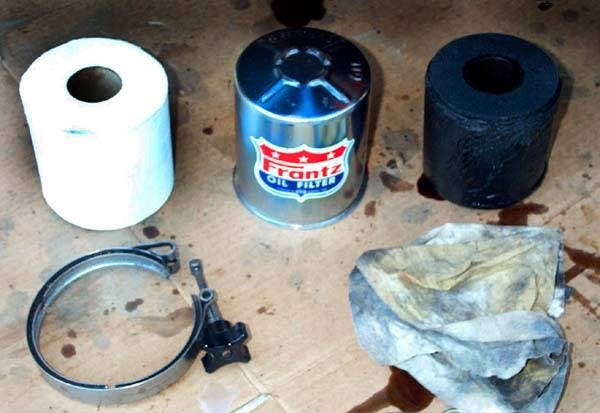
Oil becomes acidic because of the byproducts of combustion that leak past piston rings and valve seals. Even if you removed all the debris floating in your oil, you would still need to change it on a regular basis. If your oil gets acidic enough, it can damage bearings and other surfaces just as badly as if it weren’t there or if it were contaminated with chunks of stuff. Only changing the oil can prevent the breakdown of those chemical compounds. If you are changing oil often enough to keep that degradation at bay, then do you really need a supplemental filter to remove every last floating piece of junk? That’s for you to decide.
I had to have the Frantz filter for my garage. I messaged the seller, then sent over some money and my shipping address. It won’t be installed on the Corvair, but I’m not going to call the Frantz a gimmick, either. It’s a fun conversation piece that I can mount behind the workbench and maybe even use as a storage canister for hardware or little bits that need to stay safe while I’m working on a project. After all, what gadget is more interesting than one meant to equip your vintage ride with a roll of toilet paper? I can’t think of much else.
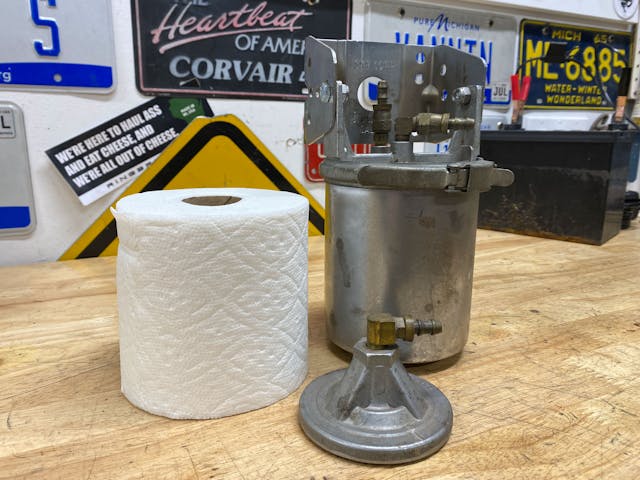
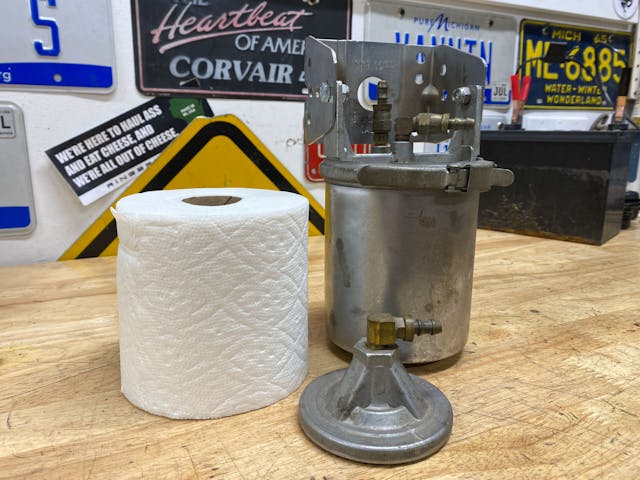
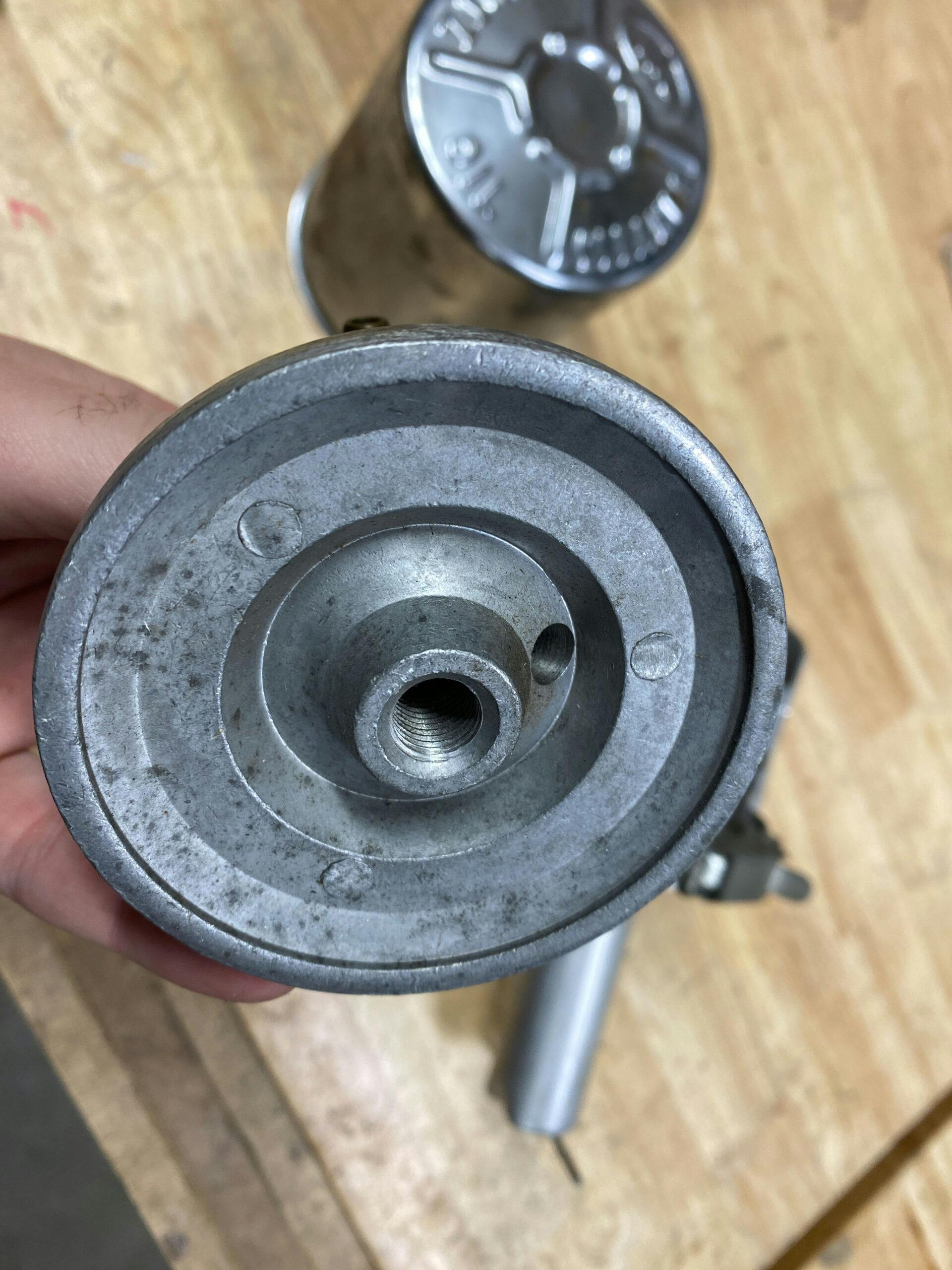
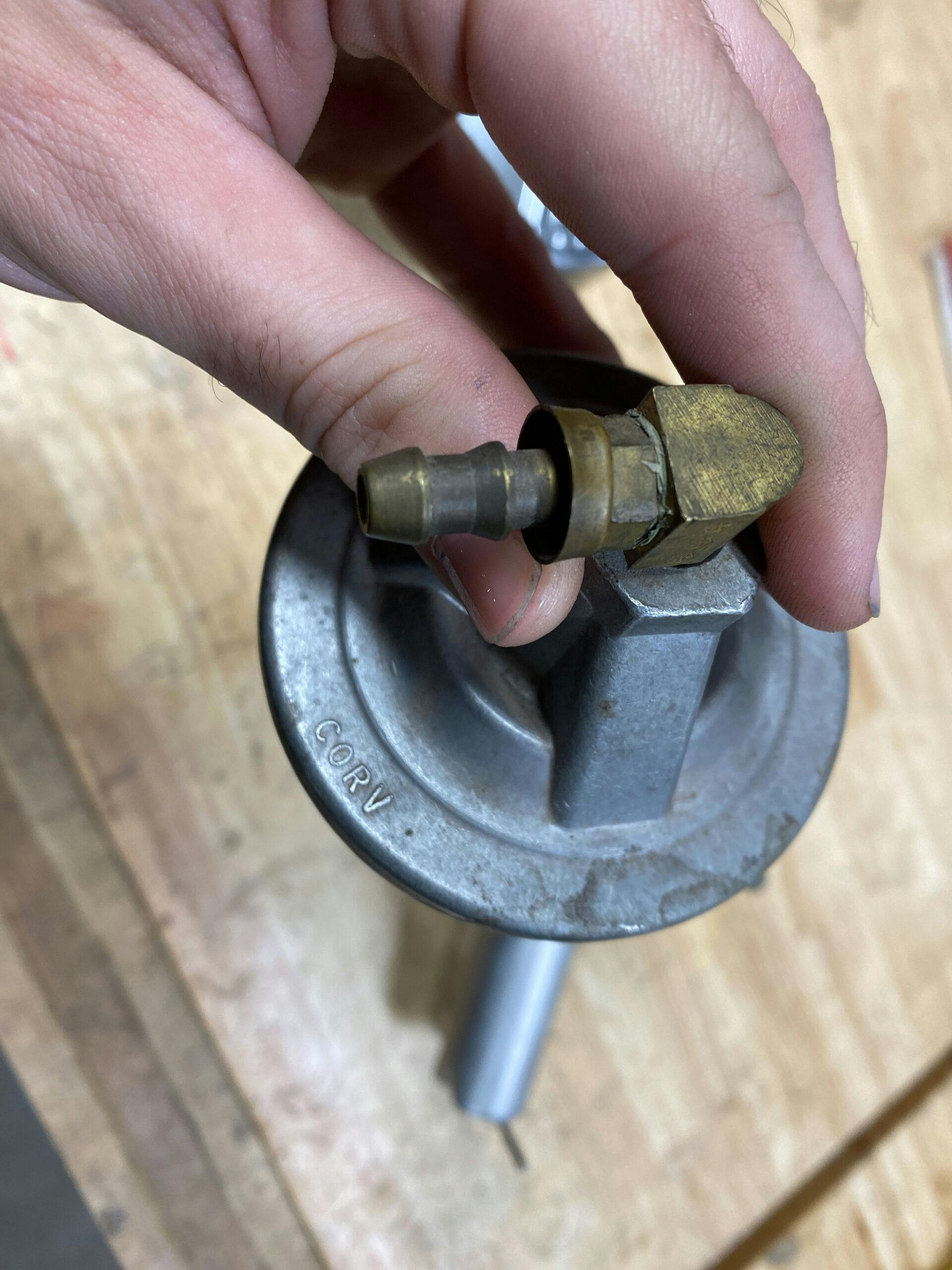
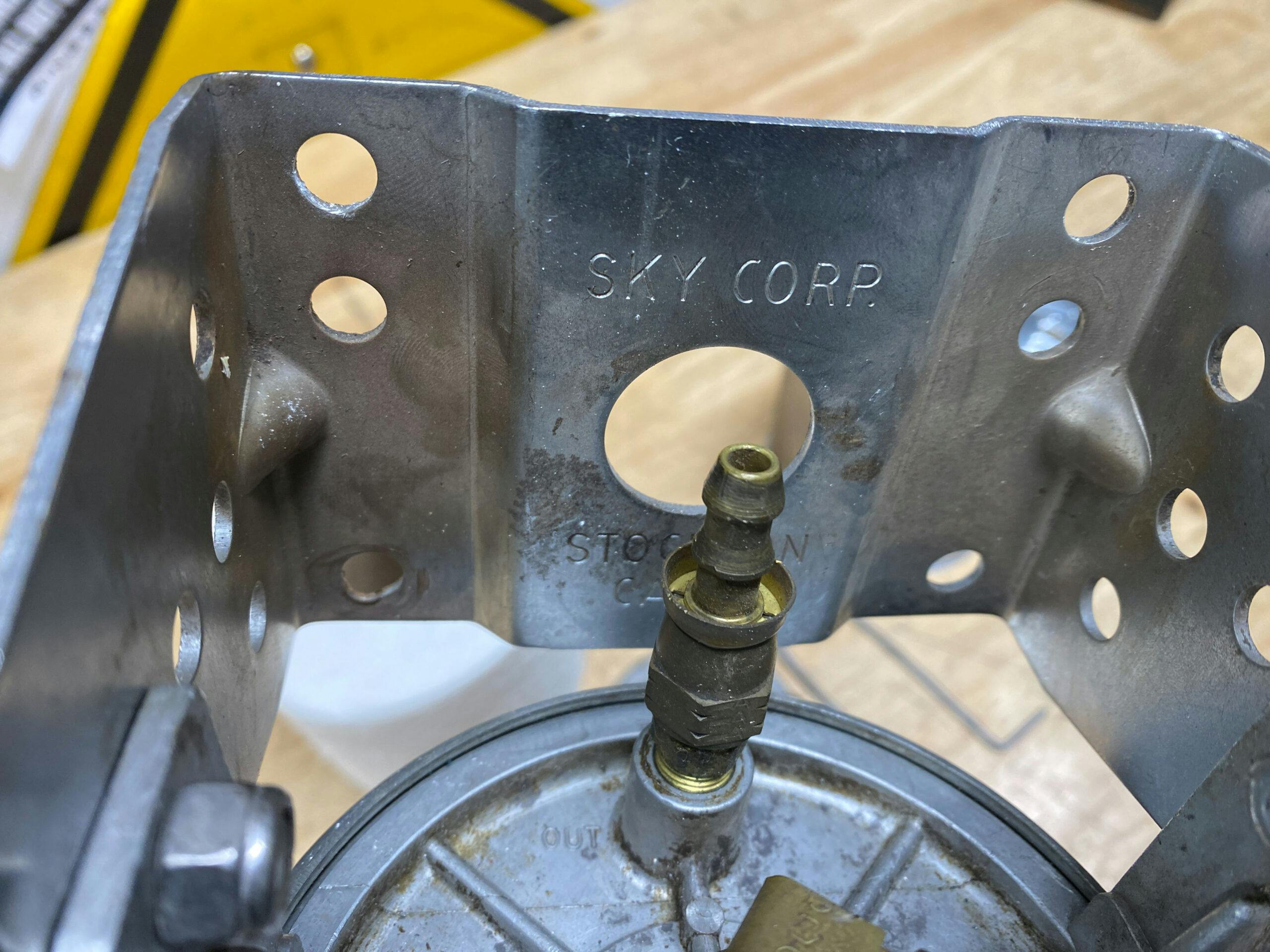
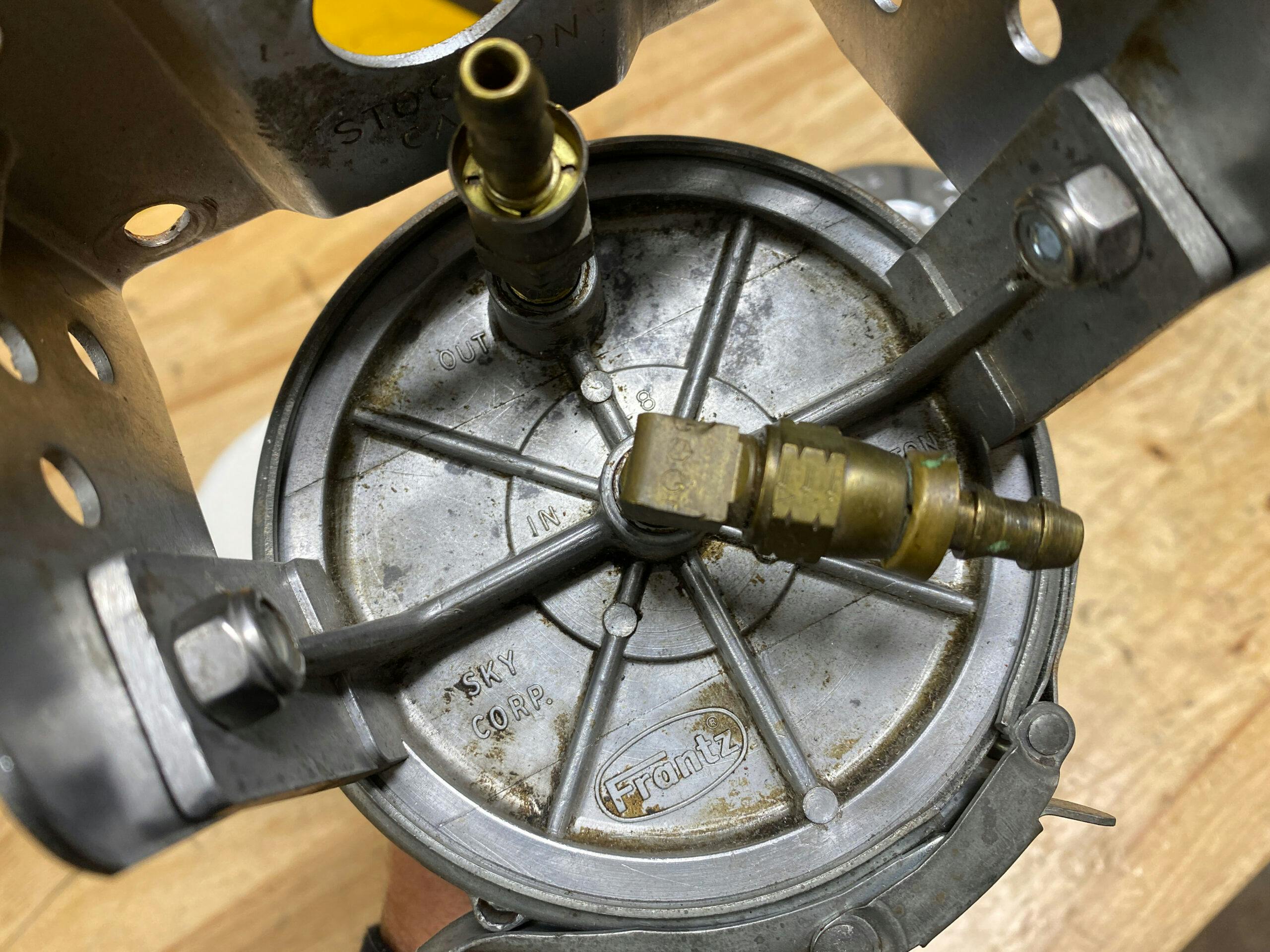
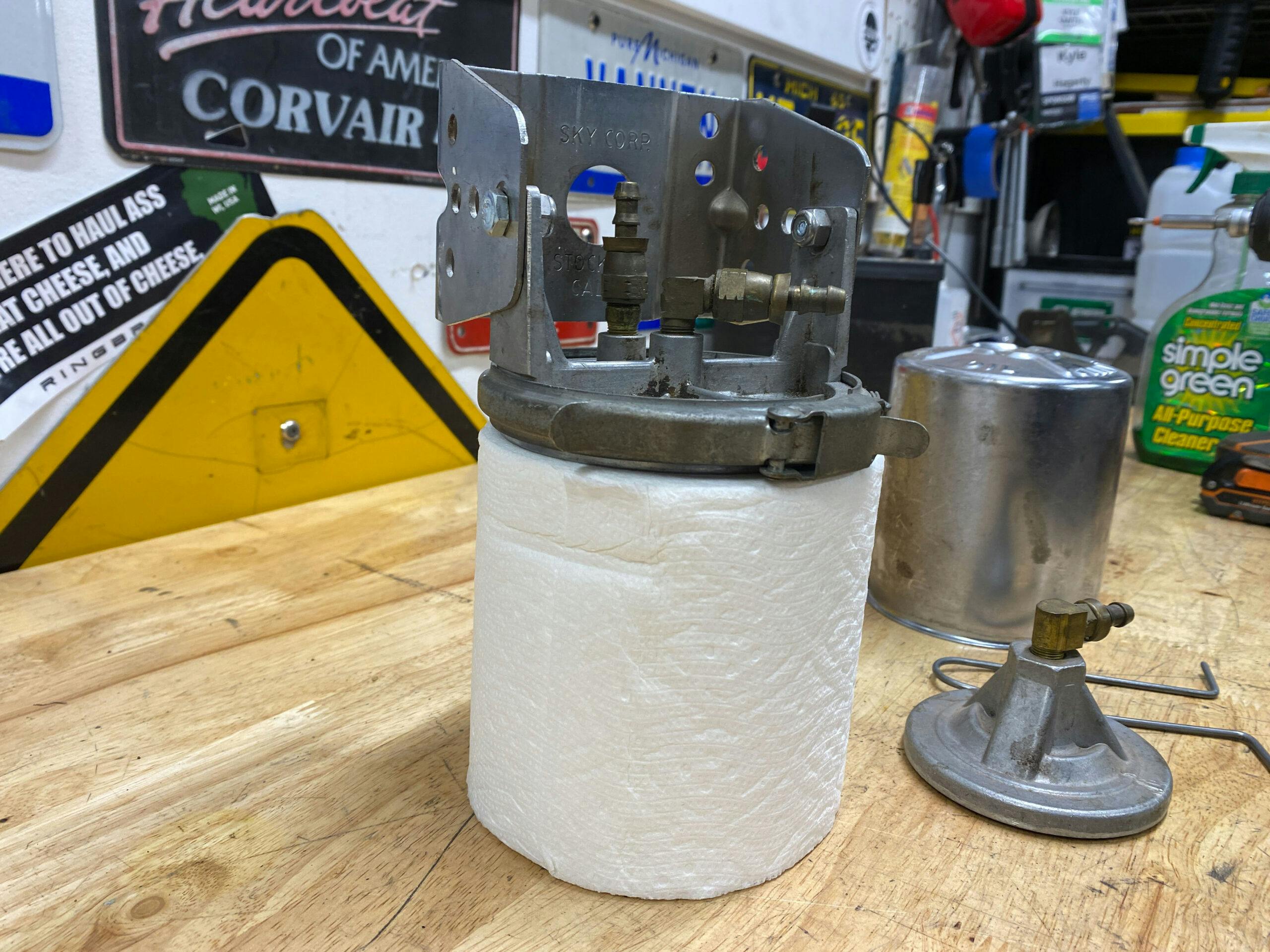

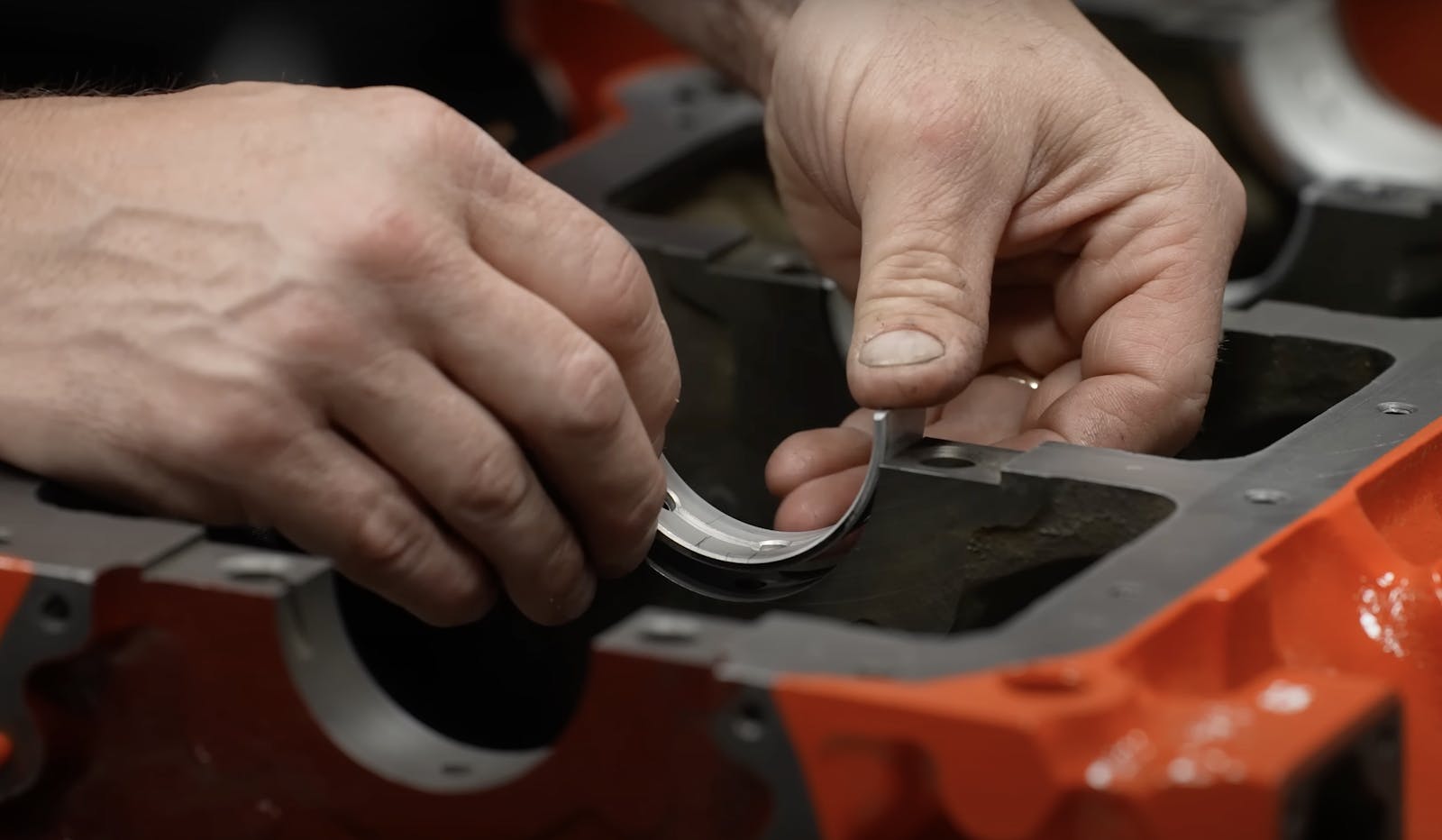
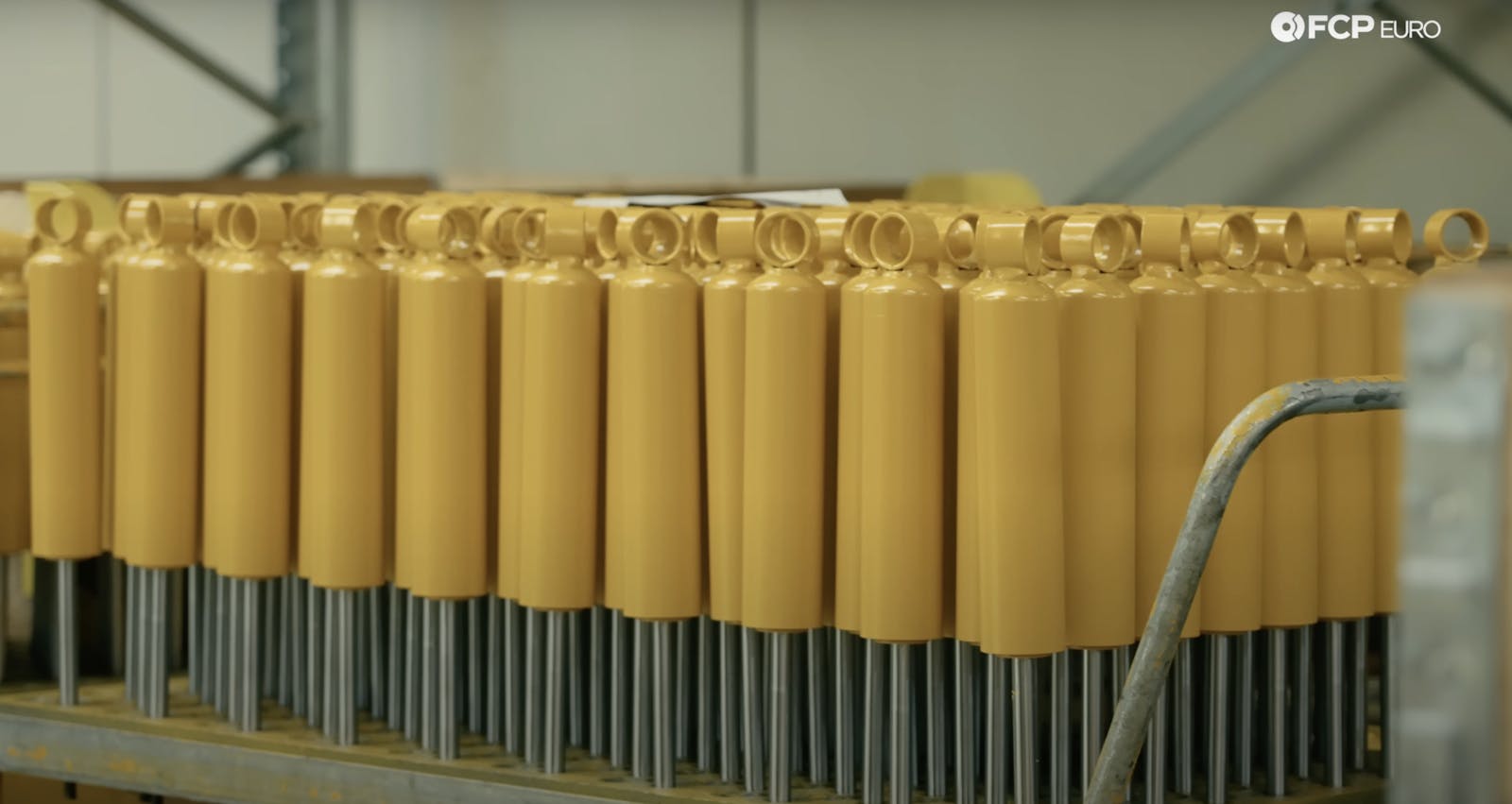
You might want to do a flow test through that TP filter before you rely on it in your car to be sure it is adequate. Just sayin’.
The Frantz filter set-up is a bypass filter only, not full flow. It will filter some of the oil that will bypass your original full flow filter. My experience shows at idle, on a cold 350 chevy in summer takes about 5 minutes to pass a liter of oil through the Frantz. Obviously depends on oil viscosity /pressure/ temperature. But I have put them on auto transmissions and engines and believe they really do work for me.
At one time Frantz had transmission adapters that went in a oil cooler line. It was two tees with a orifice in between. The fluid hit the orifice and part of it went to the Frantz. From the Frantz the fluid went to the other side of the orifice. The Gulf Coast filter company used a 1/8 inch orifice. The Frantz used a size smaller. For the Buick Dynaflow I removed a high accumulator test plug for pressure and returned the clean fluid to the oil pan with a self tapping hollow bolt. It only worked in drive but that was enough. The Dynaflow cooled the fluid with fins on the torque converter. Used a Motor Guard oil cleaner. Had to make an adapter for the 06 Pontiac Torrant. Also used a Motor Guard on it and the Farmall H tractor. The Farmall has a Impala automatic transmission with the 2.5 chevy engine. Some Frantz users just drilled out the orifice and put the Frantz in series with the cooler. For that I would probably use a paper such as Charmin ultra strong. With the toilet paper filters I dont change the fluid or the stock filter in the pan. The old Ford use a Gulf Coast junior. The Impala has a better stock filter than the Ford which has a screen in the pan.
First thing to understand is this is a bypass or surplus filter. I used one on my WV for years and my oil was cleaner than the Wvs with out a fillter. The carbon and any lose particals would collect on the top of the roll.
After a change of tp the oil was kept as clear as when you added it. Any time you keep the junk out of your bearings is a good thing. It also filterd out gas and water in your oil. I’marley installing one on my 1942 WLA Harley
When i met my wife she had a 66 VW beetle. The VW repair shop told her since the Beetle had no filter she should change the oil every 1500 miles. I put a Motor Guard oil cleaner on it. The Motor Guard filtered from the bottom up. I had to tilt it so the large chunks of steel and aiuminum wouldnt go back to the engine at shut down. All of the excess oil went back to the engine ar shut down. Frantz recommended putting the Frantz upside down on the beetle. Hell no. The first toilet paper change I had about half a teaspoon of metal in the bottom. It took several toilet paper changes to see virtually no metal. Never changed the oil again. Until we went up to Idaho. Drained the Delo 30W and put in Mobil 1 5 20.
Been using toilet paper filters for 60 years starting with a Frantz and Standard Delo 30W. Filters that clean oil are all bypass depth filters. You wont have an acid problem if you use a good oil and keep it clean and dry. I went to the better designed top loaders in the 80s. The Pontiac has a Australian Jackmaster Classic. The others have Motor Guards and Gulf Coast juniors. I have a flat head Ford V8 canister filter that I set up for Scott 1000. It has half a roll of Viva towels in it now. The adapter that eliminates the full flow filter is a little risky unless your engine is pristine.
All these bypass filters do is keep a clean stream of oil going to the oil pan. The supply of the oil going to the engine is seperate. Its a little different with my Ford diesel tractor. I got a few Perma Cool universal oil cooler sandwich adapters from Jegs years ago. They work the same for bypass filters. The clean oil feeds into the full flow filter inlet.
Order from your JC Whitney catalog! And while you’re at it get Winky the Cat that goes on the package shelf wired into your brake/signals lol. And a Hollywood Wolf Whistle. I could go on from childhood reading lol…I miss JC Whitney.
I had all of those items from JCW – and a set of curb feelers to boot! 😎
I love my France filters I got one for my my vibe and I also have one for my Ford ranger. My Ford ranger has 310,000 miles on it. I vibe is 210,000. It’s a 2004
Frantz filter I used Google voice I love them. Also put them on my transmission to keep my transmission fluid clean the other comment said about my ranger and also my vibe
Many years ago I sold the Frantz oil cleaner.Seems like I remember the Vibe is a Toyota. A guy asked me if it was too late to put a Frantz on his Corolla with near 100.000 miles on it. Asked him how long he planned to keep it. He said a long time. I said it needs a Frantz. Years later my wife was introducing me at church. She said mr Biggs this is my husband. He said I remember Ralph. The Corolla has over 500.000 miles on it. Took the boy scouts on a camp out. They found the Frantz elements
There are toilet paper filters that spin on in place of the stock full flow filter. They use about 1/3 of a roll of toilet paper. Because you cant get enough oil thru the toilet paper to supply the engine a large bypass valve is always open when the engine is running. They are not practical. I believe JC Whitney sold one. Modern ones are Stilco and Trasco.
These were proven to be failures decades ago. They clog up and oil goes through the bypass valve, if there is one. If not, either the can blows out or the crank seizes.
I did a search and can find absolutely nothing to support the statement that TP filters come apart and cause problems
Its not fair but BS stories come with toilet paper filters. They dont have to prove the BS stories. When I saw the oil in the Rambler go from black to like new im thinking everyone will want one. I set up at the big Berryessa flea market in San Jose California with a Frantz demonstrating machine. I sold a few filters. It seemed every liar and fool in San Jose came by and told me the toilet paper would break down in motor oil. Almost got into a few fist fights because I would argue with them.
That is impossible since they are a bypass filter, if it did indeed plug up there would be no infuence what so ever on normal oil flow through engine.
I have 3 of these units, and I can tell you the first time I changed out one of these filters, I was amazed at how the oil in the paper, made it all stick together. There was no pieces of paper that had shedded off anywhere, and the entire roll came out complete. Now, I have read that if there is a lot of water that is filtered out, it can make the roll come apart, but I have never seen that happen.
B.S.! Prove what you claim!
You clearly have no knowledge to which you are commenting on. The Frantz filter is a bypass filter only, so even dead-heading it would have no effect what so ever on actual oil flow through though oil galleries in the engine. Oil will actually fortify paper, and not deteriorate it as you state.
Ive heard some stories.They come with toilet paper filters. Havent heard that one.
That couldnt happen with a conventional bypass filter. If the filter reaches its capacity and oil stops going thru it. Clean oil wont get to the oil pan. Why cant intelligent people understand that. Im not very smart and it seems simple to me.
Are you talking about a toilet paper full flow filter. There is no such animal. The toilet paper filters that screw on in place of the full flow has a bypass valve that is always open when the engine is running. That converts the full flow system to a bypass system with an undersized bypass filter. They will clean oil. I still have one I bought to study over 50 years ago. I still have it.
When I was in high school, my first car was a 1937 Plymouth coupe which cost me $137.50 in 1950. Soon after I installed a bypass filter adapter, and it used a toilet paper filter. I still had the original filter factory installed and changed both every 1000 miles. I cannot remember for sure but probably bought the device from J C Whitney
They operate only as a bypass filter so you end up with two filters. There is nothing wrong with a bypass filter per se, but toilet paper by design breaks up when in contact with water—something there is a lot of when an engine has a lot of when first started.
Havent had any toilet paper come apart in motor oil. It gets stronger in motor oil. If the oil starts looking milky and the toilet paper feels soggy you might have something going on like a leaky head gasket.
I saw at least one restoration show where they took one of these off the car due to their reputation for the toilet paper roll coming apart and clogging every oil passage in your engine.
Not to mention that that toilet paper roll is infused with god knows what to smell good, wipe good, and not clog a septic but probably not intended to mix with the additives that are supposed to be in your oil
I used one for several years. Toilet paper does not react to oil the way it does paper. Also, these filters are not meant to be a replacement for a standard oil filter. It is meant to filter oil at at a precise rate to return filtered oil back to the pan. This way, oil pressure is not affected.
The so called toiltet roll is actually a very specific grade of paper. It was used by a toilet roll company for many years. However they changed the product. The filter company making the filter system now supplies the paper roll. Its much cheaper than a standard oil filter. However it filted is to be cganged out EVERY month, and about 1 liter of new oil added to replace what comes out in the filter. This puts enough oil with fresh additives in it to maintain the oil’s stability.
The Frantz was designed to use 2 ply toilet paper with a 1 1/2 inch core in 1953. The paper these days is shorter and has a larger core. You can use it but you need to know what you are doing. With my top loaders I just push the paper in and put on the lid. I normally use Great Value 1000 from Walmart.The Ford canister filter uses the larger Scott 1000. It is on my Ford Diesel tractor. Got into a debate with a NASA diesel equipment engineer. They started using the Gulf Coast filter. They were moving the shuttle then.
The Australian Jackmaster Classic takes a very high quality roll of Australian toilet paper in a cloth cover. The cover has a pull ring to remove the.used element. They did set it up with a larger core seal for peasants that use toilet paper. They charge 20 bucks for their elements. A peasant like me uses Great Value 1000 from Walmart and removes the used roll with long nosed pliers. The Jackmaster Classic has no center tube to put sleeves on. They depend on the larger core seal at the bottom.
There is something about toilet paper that gets the BS stories going. No one has ever gotten toilet paper in their oil passages. Saw some FAA and PMA approved AeroFrantz on crop dusters north of Sedan Kansas about 1980. The Frantz 3 stackers were all over the Gulf of Mexico on expensive marine diesels. Not sure when the 3 stackers went out of production. The big Frantz dealer replaced them with a big filter that takes Bounty big roll paper towels. Thats the Gulf Coast filter company out of Gulfport Mississippi. 3 stacker meant they took 3 rolls of toilet paper. A very effective filter but a mess to change. Too many parts. It took two of them on a 8V 71 Detroit. I have no idea how many they put on a offshore rig locomotive engine.
One fool told me toilet paper had too much acid in it to use for oil filters. It never ends. Frantz and others are trying to get out of being called toilet paper filters. Too many of us old toilet paper squeezers for that.If you pull out a used roll it should be strong and tear at each sheet. If its not strong it has been in there too long.
I prefer the top loaders but the toilet paper cant leave any of the filters. If tissue migration was a problem I would have figured it out by now. I used the Frantz for 20 years before I went to the better designed top loaders. A reputation for TP clogging the passages. Good grief. I saw one of those on YouTube. Luckily their were Frantz users in the remarks.
Back in the 70’s my Dad had a sweet black 64 Caddy Deville. A guy from our church was selling these Franz filters and talked Dad into letting him install one in the Caddy, telling him how long it would make his car last. As soon as the guy was done and started the engine the main bearings seized up. So much for longevity.
Another toilet paper story. A guy told me he went to change his Frantz and the complete roll was gone it was somewhere in the oil passages. When Dune Buggies and hot VWs tested the Motor Guard toilet paper filter in the 60s they put a inline fuel filter in the return line to check for tissue migration. None was found. They did a nice article on them.
A filter media designed to dissolve in water sounds like a great idea. The fact that this didn’t occur to the author…
“toilet paper as an oil filter is not crazy.”
…while half the article is about chemical breakdowns that 99% of us will never see is telling.
My old ’57 Caddy had a drop-in cartridge oil filter.
I was told that a roll of toilet paper could be used…
I wasn’t that adventurous — or dumb.
CORVAIR ON TURNER CLASSIC MOVIES ALERT!
Tomorrow, Saturday morning, TCM is airing “The Corvair In Action” (1960) at 5:45 AM.
John Frantz started putting a Frantz canister inside the old canister filters in 1953. Saw some Purolator toilet paper filter conversions on Ebay. Probably John Frantz models. Later he started using his own chrome plated housings. Then he came out with a two knob model then the improved over center clamp model.
Toilet paper didnt work in the full flow filter canister. It had to be a bypass filter canister. And you needed to know how. The oil had to go thru the paper instead of around it.
I used to work at a tribological engineering company and analyzed oil filters and oil samples for a living. Toilet paper is a bad idea because it doesn’t have anywhere near the necessary flow rate to keep the engine properly lubricated. A normal automobile engine oil filter should have no significant contaminants because it should be a sealed system and automobile filters get changed and wasted needlessly. There will always be some ferrous wear particles, but if anything else gets trapped in the filter like bearing materials it’s a sign the engine is self-destructing. One of the contaminants I tested for was water which is a combustion product that condenses when the engine is cold started. The toilet paper will just absorb and trap all the water which will further hinder oil flow. But you can use that Frantz toilet paper filter in the bathroom as a cool toilet paper holder.
Of course a TP filter doesn’t have the flow rate of a normal filter. That’s why it’s a bypass filter and doesn’t need a full flow rate.
I hear you. If a bypass filter clogs up clean oil stops going to the oil pan. When I saw the dirty oil turn clear on my nearly new Rambler. I put a Frantz on my uncles 59 Ford. In less than 50 miles the Frantz wouldnt heat up. It was full of sludge. Also he had removed the thermostat. I said we have a choice open up the engine and clean it or change the Frantz every 50 miles. He traded the car in on a new 63 Dodge pickup. When I was putting the Frantz on the Dodge his brother drove up. He said my Frantz is no good. My oil is dirty and my lifters are noisy. I asked him if he changed the Frantz. He said change it the dealer said it would last a lifetime.
Another toilet paper story. You can get paper as good as toilet paper now for about 35 bucks. My 41 Dodge had a bypass filter that used cotton toilet paper is better than cotton.some of the big truck 750 filters use pulverized newspapers and wood chips. Cummins Fleetguard 750s Luberfiner 750s.
Not to be rude but you dont have a clue about bypass filters
Look at a 1958 Dodge K-Model Commercial truck with the Fireball Flat Head 6 cylinder
…and almost three full pages of just gearshift knobs, how cool is that?
Negative Nelly’s! To all the negative commenters, the; my dad’s mates friend’s acquaintance had one of these….. REALLY.
The only reason I am bothering to respond to all this B.S. is because there may just be someone reading these comments, who gets put off by the naysayers, most of whom have probably never seen, let alone tried one of these and some of whom can’t grasp the concept of “BY-PASS”.
If you look at the way these filters are designed, firstly, I can’t see any way possible for chunks of toilet paper to get through, even if the paper did fall apart. Secondly, it’s a by-pass system, so the factory system is still in place. This system is in addition to the factory system and if installed correctly, cannot affect the operation of the factory system.
This system is effectively like having a separate filter sucking oil out of the sump, cleaning it and putting it back into the sump. Because the filter cleans so well, it doesn’t take long for the oil in the sump to come back to clean as new!
I am running a triple filter in a 13ltr detroit engine. The detroit are renowned for oil to be sooty and black as soon as you run them, (most diesels are black and sooty in the sump, but I have found the detroit especially sooty and I have run a few of them and currently still running two), but after fitting the triple stack Frantz filter, it took only 2500km (just over 1500miles), before the oil in the sump was very noticably cleaner. By the time the engine had done 5000km (3000 miles) with the Frantz filter, it was difficult to see where the oil level was on the dipstick as it was so clean.
I have absolutely nothing to do with Frantz filters or toilet paper for that matter (other than using them), I run a small transport business and have always been into cars and mechanical stuff and have read many articles regarding Frantz filters over the years, so have been wanting to try it for myself.
My first experience was an old Ford louiville at the wreckers. It was parked out the front with trucks they try and resell complete. I noticed a triple stacker Frantz filter in the engine bay and when I checked the oil, it was sparkling clean. I didn’t know the history of this truck or how long this filter had been on it, but I was more keen than ever to try it out.
Well, as soon as I spotted a triple stack filter in the for sale ads, I bought it and I can say it is one of my better purchases. I have been using the filters from Frantz, cellulose fibre media rolls, rather than toilet paper (seems much the same as toilet paper, just tightly wound) at about $4.95 per roll and I am looking for any more triple stackers I can find.
I probably shouldn’t have typed this up, as it will make it even harder to find a 2nd hand triple stack filter, but I am sick of reading the B.S. negative comments from people who either don’t seem to have a clue, or have some ulterior motive.
P.S. I am looking at buying some of the new single filters for my cars very soon, but I find the original triple stack type better for the bigger truck engines.
Good man!!!
. Experience and specific detail, no Bad Science and inflated self opinion.
Excellant response to all the self opionated people who are about 20c a train load.
I hear you. I was putting a little Frantz on a Chevy Luv. I noticed a little Frantz on the frame of his 18 wheeler. I said that Frantz is too small for that truck. He said no it isn’t I change it every day. Was at the Denton Texas flea market in the mid 80s. An old couple showed me their 53 Chevy they bought new and put a Frantz on it. An over the road truck pulled off the highway. He said come and look at mine. He had two Frantz 3 stackers on the firewall. 8V Detroit 2 cycle. Said he gets a 6 pack of Safeway Truly fine to service them. I also got the typical liars and fools. One guy told me so much toilet paper was getting in the oil passages Frantz had been outlawed in Texas. I was licensed and insured to sell Frantzs in Texas. The BS stories can put you out of business.
Bypass filters have been put on engines since the 1920s. Usually optional equipment. They all have a restrictor orifice. Usually 1/16 inch. Many people assume the toilet paper has to supply the full flow of oil to the engine. All the toilet paper has to do is keep a stream of clean oil going to the oil pan. The flat head Ford canister filter toilet paper conversion is a little different. It used a Perma Cool universal sandwich oil cooler adapter. Instead of the clean oil going to the sump it feeds into the inlet of the full flow filter. It just hooks up the same as the oil cooler. For that I dont need an orifice. The old Frantz 2 port sandwiches were similar. I still have a few.
When the Frantz 3 stackers were no longer available. They were replaced by a big filter that uses Bounty big roll paper towel. He needed a polished tube to slide the towels into. He used a piece of 6 inch hydraulic cylinder tubing. I did a fleet of trucks in my younger days. At 83 if I got under a truck someone would need to pull me back out.
I wont use a bypass filter unless I can use toilet paper in it. I put a spacer in the bottom of the old San Leandro California Motor Guards to push the core up against the core seal. The San Jose California model only works with 1 1/2 inch cores. It seals inside the cores. Sometimes Walmart has a few 1 1/2 inch core Scott 1000. Gotting hard to find. The Australian Jackmaster Classic has a 1 15/16 inch core seal at the bottom. The same as the Gulf Coast junior. The Jackmaster has no center tube. It and the Gulf Coast junior are my best filters not counting the Ford V8 canister filter. I am a master toilet paper squeezer.
I don’t know what’s more stupid…being ignorant of the benefits of bypass filtration or essentially knowing the benefits and then not installing that filter on an engine you want to last essentially forever. The author is clearly an ignoramous. This is why u guys are purchasing vehicle after vehicle after your engines go south.
Its not fair but BS stories come with toilet paper filters. They dont have to prove the BS stories. When I saw the oil in the Rambler go from black to like new im thinking everyone will want one. I set up at the big Berryessa flea market in San Jose California with a Frantz demonstrating machine. I sold a few filters. It seemed every liar and fool in San Jose came by and told me the toilet paper would break down in motor oil. Almost got into a few fist fights because I would argue with them.
Bypass filtration is a proven science that works. I worked for a company called filter clean for over 15 years and they specialise in oil bypassed filtration by using a canister and a paper roll. We used to use specialised paper which was three ply which did not break down in water were as toilet roll is designed to break down in the water, but our paper would not break down in contact with any fluid. These were specially tightly wound and also had a stockinette cover on the outside. We have manufactured hundreds of these units and we fitted them from commercial vehicles to injection moulding machines and also was sold all over the world, and then filtered down to one micron which meant that an average commercial vehicle instead of changing the oil every six weeks. They could do a yearly oil change and it was proven time and time again with the system fitted after 1,000,000 miles there was minimal wear and the engine was very clean, which also saved the end user, money in regards downtime and also buying filters and oil from the vehicle manufacturer
I have no way of measuring microns. The Australian Jackmaster Classic claims 1 micron if you use their elements. Motor Guard has always claimed submicronic. The Australian Jackmaster Classic uses a high quality roll of Australian toilet paper in a sock.I would think the toilet paper filters would be about same with the same flow rate and oil and pressure. Motor Guard only makes compressed air filters now. Gulf Coast filters might have dropped their nice top loaders. I think they are working with the Jackmaster filter company. The Jackmaster Classic is similar to the Gulf Coast junior my favorite two. Havent sold filters in a long time. My biggest fleet customer said they had more trucks. Told them to call Gulf Coast filters. Too old to crawl under trucks.
Several years ago, I bought an old Frantz bypass oil filter from an online antique shop and installed it on my 2004 Suburban at about 146,000 miles. It uses a roll of toilet tissue that filters down to 2 micron particles. No spin on filter catches anything smaller than 25 microns. It dumps a half gallon of clean oil back into the engine every minute. I drove the Suburban to almost 400,000 miles without changing the oil – just the filters – when the original transmission failed and I decided to junk the truck, as the body was getting pretty rough (I’m on the southern edge of the Rust Belt,) The engine was still fine. I changed my spin on and Frantz filters on average every 4000 miles. The exception to the oil change rule was that I had it in for a tune up once, and they changed the oil without asking me. I ran Lubrication Engineers oil throughout the truck (engine, transmission, rear end and power steering) from the day I bought it at 121,000 miles.
The end of its days:image.jpg
I then bought a 2010 Suburban with 197K miles in Arkansas. It was garage kept and never in salt. The following pictures show how I mounted the Frantz on the “new” Suburban. It has an empty battery mount behind the left headlight because the battery is on the passenger side inner fender. I got a piece of 3/4” aluminum plate from a salvage yard, machined it slightly to bolt it in place of a battery, and mounted the Frantz onto a piece of aluminum angle iron.
IMG_1948.JPG
The ledge I machined to fit under the battery bracket:
image.jpg
Easy access for filter changes:
image.jpg
The filter base and bypass hose that feeds oil to the Frantz:
IMG_1975.JPG
This picture doesn’t really show it, but my ‘04 bypass adaptor didn’t clear the oil pan, so I had to reduce the OD for about 1/4 of the circumference:
IMG_1976.JPG
The ledge I milled on the base plate to hook under the battery mounting plate:
image.jpg
Also, the threads on the spin on filter are different on the new truck, so I had to buy a new mounting bolt from the manufacturer of Frantz filters. https://www.frantzfilters.com/
20/20 hindsight: I could have just used the same filter as the ‘04 used.
In the new truck, I still run Lubrication Engineers oil, but also use Hot Shot’s Sticktion Eliminator and FR3 https://www.hotshotsecret.com/
I buy the LE oil in a 5 quart jug from my local mechanic and add the appropriate amount of supplemental additives to it. That way, any time I top off my engine oil level, the proper amount of additives is already mixed in.
For those who ask. “What about additive depletion?”, my answer is that oil with additives is like a cup of coffee with cream and sugar in it. You can’t drink the cream or sugar without drinking the coffee. So, as the oil depletes, the proportional level of additives remains unchanged unless you add plain oil.
I read comments by some naysayers on a blog that you need to change your oil regularly because acids build up in the oil. Well, the toilet tissue catches both water and acids. The friend who first told me about Frantz filters around 1975 had a ‘65 Chrysler that he ran for 310,000 miles without EVER changing the oil – just his filters every 3000 miles. The body rusted out, but the engine still ran like new. That was unheard of back then when 100,000 miles was about the limit for engines.
I buy Feathersoft 4” x 4 1/2” toilet tissue rolls by the case for the Frantz and use Purolator PBL 12222 spin on filters.
BTW, I run non-ethanol gas whenever possible, which is at least 3/4 of the time.
I’ll be very disappointed if my engine goes bad before a half million miles.
I had heard that there’s a class action lawsuit against GM because of excess oil consumption in Suburbans. I found out with my ‘04 Suburban that if you keep your oil clean, you’ll only use about 1/2 quart in 4000 miles. I don’t think my ‘10 Suburban uses that much. That’s what a Frantz filter will do for you: a quarter million miles without changing the oil, and lowered oil consumption.
You have my permission to use this email in any way you want to. I get nothing in return for advocating the products I mentioned herein.
Leon Patterson
LSPatterson@comcast.net
York PA
About 1965 in San Jose California there was a Mustang dragster owned by Joe Davis.He pulled the dragster with a early 60s Chevy Suburban with a 292 big 6. I put a Frantz on it with the adapter that eliminated the full flow. He liked it because he always knew the condition of the engine by what was showing up on top of the toilet paper. Before I left California I put a Motor Guard on his Plymouth Fury and left the full flow filter on. Both Frantz and Motor Guard had the adapters like in the picture. I put a 2.5 Chevy engine in my Farmall H many years ago. It has the Motor Guard with the adapter. I normally like to use both the bypass filter and the bypass filter.